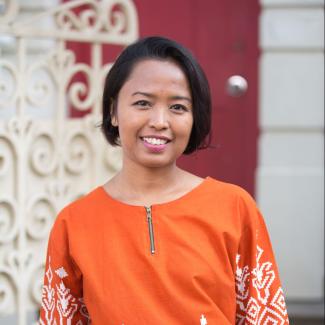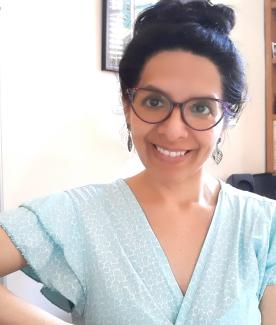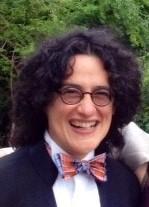Every year, AWID seeks to renew and enrich the perspectives and experience reflected in our Board of Directors by bringing in new members.
What is the Board’s role?
Our Board of Directors is critical to ensuring AWID effectively fulfills its mission to support feminist movements around the world to thrive. Our Board reflects a range of geographies, struggles and perspectives--part of the diversity and strength of feminist movements.
For each election, AWID members vote for candidates who are committed to AWID’s mission, who can make connections between local and global struggles, and who can help us to be thoughtful about how to best leverage AWID's positioning and strengths in a constantly evolving context.
We are happy to present the following Board candidates for election*:
Eni Lestari

Eni Lestari is an Indonesian domestic worker in Hong Kong and a migrant rights activist. After escaping her abusive employer, she transformed herself from a victim into an organizer for domestic workers in particular, and migrant workers in general. In 2000, she founded the Association of Indonesian Migrant Workers (ATKI-Hong Kong) which later expanded to Macau, Taiwan, and Indonesia. She was the coordinator and the one of the spokesperson of the Asia Migrants Coordinating Body (AMCB) - an alliance of grassroots migrants organisations in Hong Kong coming from Indonesia, Philippines, Thailand, Nepal and Sri Lanka. She is also the current chairperson of International Migrants Alliance, the first-ever global alliance of grassroots migrants, immigrants, refugees, and other displaced people. She has held important positions in various organizations including and current Regional Council member of Asia Pacific Forum on Women, Law and Development (APWLD), former Board Member of Global Alliance Against Traffic in Women (GAATW), spokesperson for Network of Indonesian Migrant Workers (JBMI), advisor for ATKI-Hong Kong and Macau as well as the Association of Returned Migrants and Families in Indonesia (KABAR BUMI). She has been an active resource person in forums organized by academics, interfaith groups, civil societies, trade unions and many others at national, regional, and international arenas. She has actively participated in United Nations assemblies/conferences on development and migrants’ rights and was chosen as a speaker at the opening of the UN General Assembly on Large Movement of Migrants and Refugees in 2016 in New York City, USA. She received nominations and awards such as Inspirational Women by BBC 100 Women, Public Hero Award by RCTI, Indonesian Club Award, and Non-Profit Leader of Women of Influence by American Chamber Hong Kong, and Changemaker of Cathay Pacific.
Veena Singh
Veena Singh is a Fiji Islander, a feminist and a woman of colour. Veena was born and raised in a small rural town in Fiji and is of mixed ethnicity (her mum is an Indigenous Fijian woman and dad is Fijian of Indian descent). She is a feminist development practitioner and is a strong advocate of ‘shifting powers to create positive change’ and in ‘building an economy of kindness’. Her work experience has largely been in the areas of Human Rights, Gender Equality and Social Inclusion and she has more than 18 years of professional experience working specifically in women and children’s rights, Women, Peace and Security (UNSCR 1325), Human Security, Community Development and Community Media. Veena has worked and volunteered for several Fiji-based NGOs before joining SPC- Fiji Women’s Rights Movement, FemLINKPacific, Fiji Red Cross and Save the Children (Fiji). Additionally, Veena has worked on a wide range of development areas and issues, including Access to Justice, Conflict Prevention and Peacebuilding, Sexual and Reproductive Health and Rights (SRHR), Women’s Political Participation, Leadership and in Decision Making, and more recently in the area of Gender Statistics. Her work has enabled her to work very closely with development practitioners, feminists, activists, government representatives, and peace practitioners across the Pacific, Asia, Europe, and African Region. Outside of the office, she likes to work on promoting and protecting the environment; raising awareness on positive mental health and wellbeing; and spending time on writing. She is a mum to 11 cats, proud wearer of sarees and a collector of postcards. Veena is a thoughtful observer on the direction of feminist activities in Fiji and the Pacific region, and in her own organisations, and seeks, as she describes it, "to decolonise her mind and the ‘self’ through radical self-reflection" but more importantly for her, she cares about putting out more relatable writing that will connect her with the Pacific diaspora. Veena holds a Degree in Community Development with Murdoch University (Australia) and a Postgraduate Diploma in Social Policy with the Fiji National University
Sara Cuentas Ramirez

Sara was born in Lima, Peru, on May 11, 1974. Her mother descends from the Guayocundas and Capullanas (ancestral women who were leaders in the territories of Northern Peru) and her father’s family roots are Quechua from Cuzco, with paternal ancestors that include Gabriel Condorcanqui and Micaela Bastidas (who led the first Indigenous revolution in 1781 to break free from the colonial yoke in the Abya Yala continent). She is a communicator and a journalist, a social researcher and a decolonial feminist activist. Her published research includes La verdad está en nuestros cuerpos, secuelas de una opresión reproductiva [The truth lies in our bodies, the effects of reproductive oppression] exposing the impact of forced sterilizations on women’s lives; Cuidar para sostener la vida [Care for sustaining life] showing the colonial features of the global care chain, economy and system; Educación para el desarrollo desde una perspectiva de género [Education for development with a gender perspective] analyzing and sharing a pedagogical methodology to promote critical citizens’ actions to tackle machista violence; and Mujeres migrantes, actoras del cambio social [Migrant women as social change actors] highlighting active and leading engagement by migrant women in Spain. Sara has also developed a methodology called Análisis Descolonial para el Cambio [Decolonial Analysis for Change] that integrates a decolonial feminist perspective in social transformation, research, training and collective collaboration initiatives to eliminate oppression in a variety of settings. She is an advocacy advisor for Peruvian organization IAMAMC defending the human rights of women affected by forced sterilizations. She coordinates the Decolonial Feminist School set up by Red de Migración Género y Desarrollo[Gender and Development Migration Network] that supports a diverse set of activists, students, professionals and the general public, embracing decolonial feminism to transform their lives and their contexts. Sara is a consultant on social and equality public policies. She trains public officers on issues related to racism, interculturality, decolonial feminism, equality policies, social coexistence and community participation. She also engages in situated-knowledge research as a tool leading to advocacy actions. She advises public and private entities on how to improve and incorporate measures to decolonize the Self, power, knowledge and care and to sustain community life. She writes for El País (Planeta Futuro), La Mula (Peruvian digital media focusing on social critique) and gives interviews to the media whenever her decolonial feminist views and analysis on a variety of topics are required.
Cynthia Rothschild

Cynthia Rothschild is an independent activist and human rights consultant with a focus on United Nations advocacy and policy, sexual rights, LGBTI issues, HIV & AIDS, and women human rights defenders. She is currently the Director of the UN Program at Occidental College (in California). A human rights, sexual rights and feminist activist for many years, she’s worked with a diverse range of global networks and NGOs (including LGBTI, women’s and reproductive rights groups and AIDS service organizations) within and outside the US. Cynthia is a trainer, facilitator and mentor. She’s helped direct and support feminist advocacy at the UN Human Rights Council and the Commission on the Status of Women, in particular. In 2011 and in 2015, she consulted with the UN Office of the High Commissioner for Human Rights (OHCHR), where she made significant contributions to the UN’s two groundbreaking reports on discrimination and violence based on sexual orientation and gender identity. Cynthia’s a long-time member of the Women Human Rights Defenders International Coalition, where she’s engaged in projects related to organizational development, training, advocacy and knowledge production; and the Observatory on the Universality of Human Rights (OURs) project (a cross regional effort that focuses on crises of fundamentalisms and extremism, and attacks on human rights and UN systems). Cynthia has years of NGO governance experience and has been on the boards of several NGOs, including Amnesty International – USA, Astraea, Synergia and INCRESE (in Nigeria) and the advisory board of CREA (in India). Cynthia’s also an author. She edited and has facilitated trainings on “Gendering Documentation: A Manual For and About Women Human Rights Defenders,” and has published a number of articles and blog posts on the rise of fundamentalisms and attacks on the human rights system by the “right wing.” Other publications include: Written Out: How Sexuality is Used to Attack Women's Organizing; and “Sex at Dusk and the Mourning After: Sexuality Policy in the US in the Years of Obama” (co-author). She's based in New York.
Submit your ballot by December 21, 2020.
Become an AWID member today!
The Board election process
Following our open call for nominations and a thorough review and interview process by our Board’ Nominations & Governance Committee, we are presenting 4 candidates for election who would complement our current Board’s skills and expertise.
We are counting on AWID members to help us elect strong Board members to contribute to the organisation’s governance, and who will both accompany us through the end of our current strategic plan and oversee the development and launch of our next strategic plan - a critical process for board engagement and direction!
* In past years we have organized the candidates by region. This year, we decided instead to put forward a single slate of 4 candidates who would complement the existing expertise (and regional diversity) on the Board. We are asking members to vote for two out of four candidates, with a maximum of one vote per candidate allowed and the option to abstain from a second vote permitted. The two candidates who receive the most votes are elected to join the AWID Board of Directors in January 2022.
2224x1253.jpg)